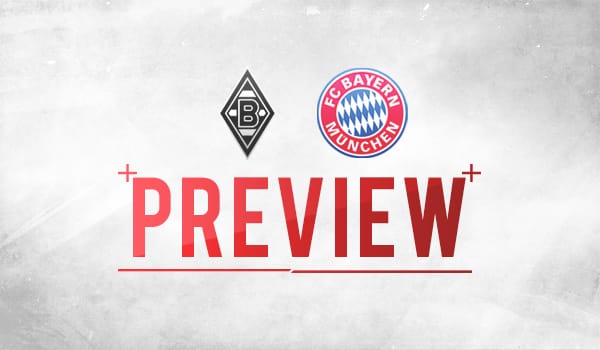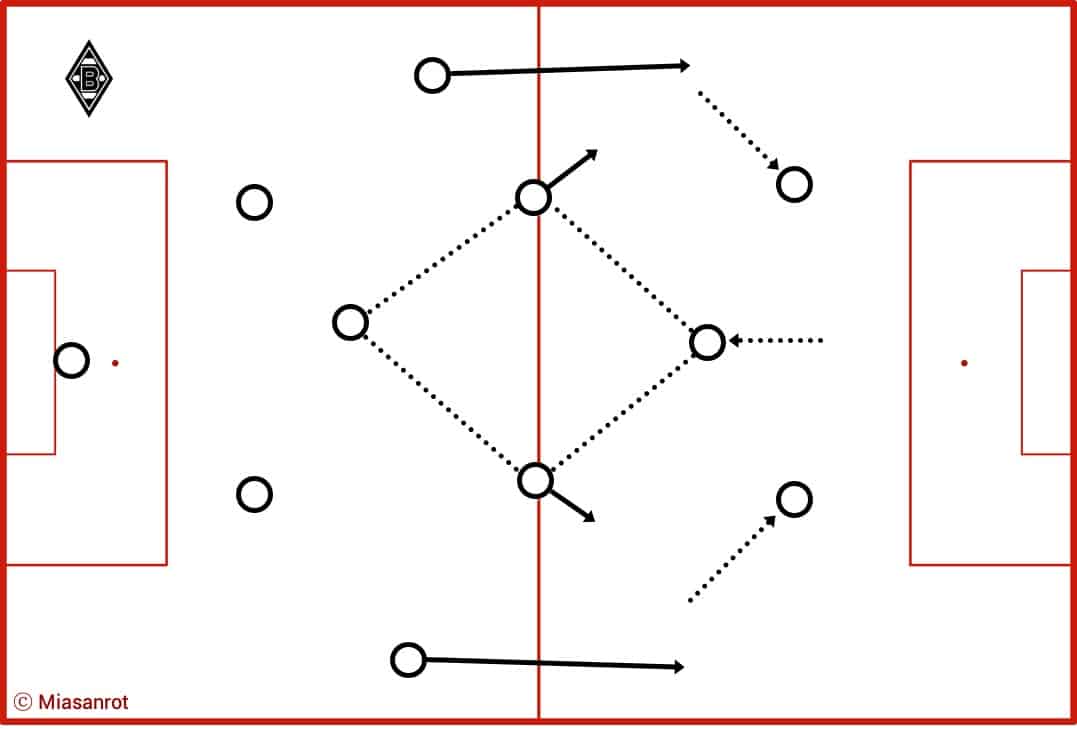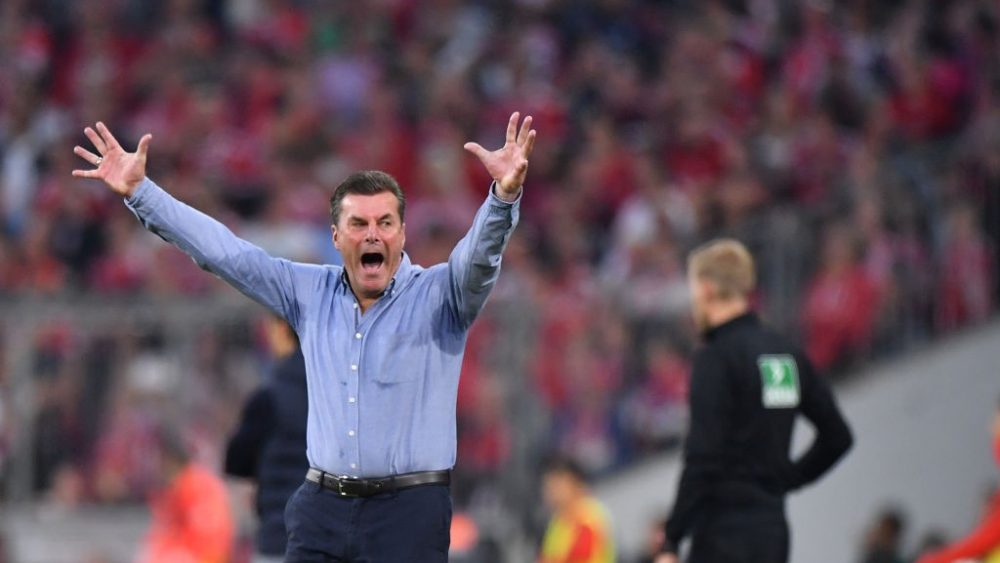Preview: Borussia M’gladbach – FC Bayern
Dieter Hecking is considered less progressive and more boring, especially among tacticians. But as is so often the case, it’s your success that proves you to be correct. And the coach has achieved that again this season.
After his 4-4-2 didn’t seem to work anymore, Hecking switched to a 4-3-3 before the new season. Thus he made his team’s passing game a bit more diagonal and a generally better fitting structure.
Last but not least Gladbach has failed to win in their last three Bundesliga games. The draw against Frankfurt as well as the defeats against VfL Wolfsburg and Hertha BSC have resulted in a setback, which is not completely surprising. The visit to Gladbach potentially comes at an opportune time for FC Bayern given the foals have had such a long period of weakness.

Is the diamond the secret to success?
There were times when the so-called “False 9” was discussed in Germany. Usually players like Mario Götze or Lionel Messi were associated with this, because they are small, lively and agile. In reality, it’s not the body that decides whether a player is a “False 9”. It’s his role.
Lars Stindl, for example, is the type of striker who approximates such a role in many phases of the game. He is also at the center of this new structure, which offers more triangles than the previous 4-4-2. With his frequent dropping, Stindl forms a diamond with the two eights and a six, which in turn forms a triangle with the two central defenders.
The versatile outer defenders push up with varying degrees depending on the team’s needs, but in some phases they can even take on slightly inside roles. This is almost hipster stuff by Hecking standards! Depending on the positioning of the outside defenders, the wing players (mostly Plea and Hazard) will move in more. Finally, they will also use Stindl’s flexibility to create space.
Variability in the squad
Hecking has a wide range of options for the different positions and roles, especially in offense and midfield. Plea has already played in all three attacking positions this season, Hazard has played on both the right and left side and with Raffael, Herrmann and Johnson there are technically strong and fast players as substitutes. And Traoré should not be forgotten either, although he has only managed 381 minutes due to a serious injury.
In midfield, Hecking also has a large squad with Strobl, Kramer, Zakaria, Hofmann and Neuhaus, who all bring different qualities. While Strobl, Hofmann and Neuhaus prefer to play with the ball and are mainly responsible for passing or dribbling into the gaps, Kramer brings a more robust component into midfield. Although he is also a technically gifted footballer, the difference to Strobl, for example, is immediately apparent. Zakaria is more of a complete box-to-box player who can do a little bit of everything.

The 22-year-old brings a vertical dynamic into play as an in-between, because he can impress with both clever vertical dribbles and skillful passes. However, he can also handle duels and thus becomes the all-purpose weapon in Hecking’s midfield. It is particularly important for the coach, however, that all five players behave wisely under pressure and thus give the team a sense of security and calm in a league that is very good at pressing.
What awaits FC Bayern?
Another strength of the Gladbach-based team is its well-organized pressing. Hecking has been able to organize almost all his teams well. He has also succeeded with the Borussia. With only 25 goals against the foals are tied with Borussia Dortmund for the second best defense of the league. 31.52 xGA (Expected Goals Against) is also the fifth best figure in Germany’s top flight.
However, Hecking’s team has experienced problems, especially against well-organized defensive lines. Gladbach does not yet have the necessary explosive power to score as many goals as a top team and to win close matches. 42 goals is the sixth best tally in the league, but there could be more.
Perhaps that’s also the coach’s biggest weakness. Hecking’s system has also suffered from inconsistent offensive play at his previous stops, if he didn’t have at least one outstanding attacker. Against FC Bayern, however, all this plays a less important role. Similar to the first leg, Gladbach will look for counter moments from a compact defense. A good midfield structure and fast external players will be their keys to success. The outer defenders will play a major role in this. Bayern has had its biggest problems this season when they could be attacked with high speed and a lot of space in midfield. They therefore need to have solid coverage in the event of turnovers.
What to expect from Kovač?
Consequently, it is not just important to FC Bayern what can be expected from their opponents. It is even more important what can be expected from the Munich players themselves. The sobering answer is: there has been very little progress. Kovač and his coaching team don’t place much value on positional play. Therefore how secure Bayern will be when it has the ball will depend on the line-up in midfield.
Perhaps Bayern will even continue to rely on the defensive backs and a cautious six to give Gladbach little room in the transition moments. However, FC Bayern need a win to stay in the championship race. If Kovač does not take more risks here, there is a serious chance of a game similar to the one against Hertha BSC, which could have gone either way. Bayern needed a standard. Ultimately the Rekordmeister won a game where they created very few chances for themselves.
Against Gladbach that will not work. Their defense is much too stable if you don’t challenge them, they’re too confident in combination play if the aggressiveness in the center isn’t there. At the front they have two extremely dangerous players: Plea (13 goals, 3 assists in 24 matches) and Hazard (12 goals, 9 assists in 24 matches). And also Stindl, the man who makes space for them. If Bayern overreact, they will drown against this opponent. It doesn’t matter whether Gladbach is currently experiencing a phase of fragility or not. Things become even more difficult for Bayern as well due to the losses of Ribéry, Robben, Coman, Alaba and Goretzka. But that can’t be an excuse if they want to become champions for the seventh time in a row.









